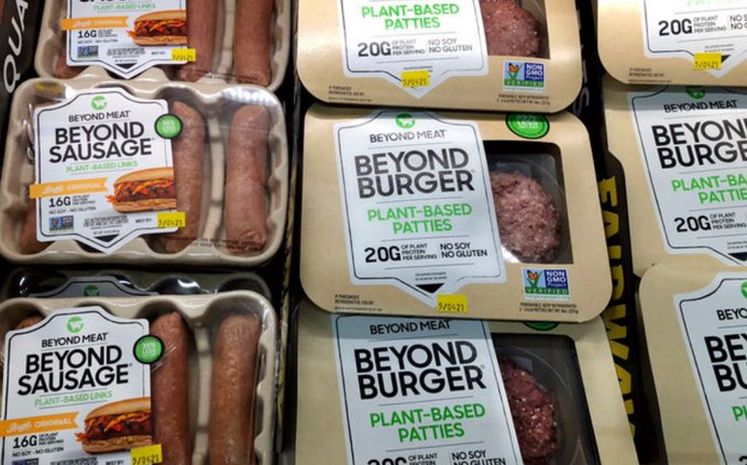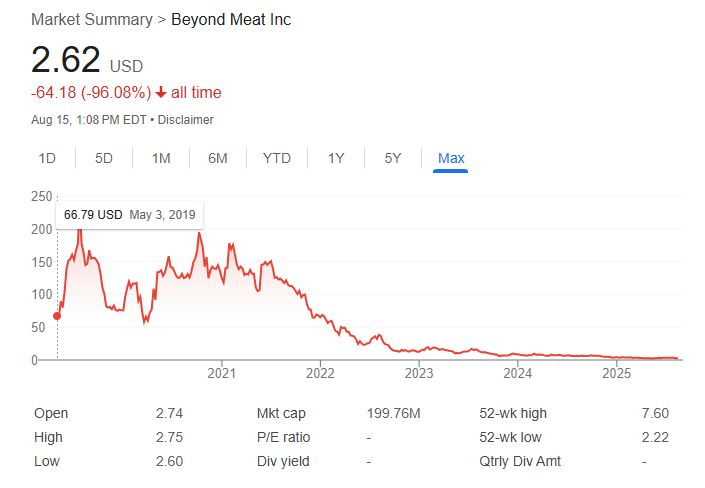Beyond Meat says it’s not going bankrupt, but the numbers tell a different story

Four years ago, Beyond Meat was riding high, celebrated by celebrities and investors as the company that could change how we eat. Its burgers and sausages landed in major grocery chains, and at its 2019 peak, shares hit $234.90. But the buzz didn’t last. By 2022, the stock had lost 80% of its value, and by March 2025, about 95% of its market cap had disappeared.
Now, the drop is even steeper—down roughly 98% from its high. On Tuesday, rumors started circulating on social media that the plant-based pioneer “is reportedly heading towards bankruptcy,” with some posts claiming a Chapter 11 filing was imminent. Beyond Meat fired back, calling the speculation “unequivocally false.”
“Recent media stories suggesting that Beyond Meat filed for bankruptcy are unequivocally false. We have not filed nor are we planning to file for bankruptcy. Go Beyond,” Beyond Meat said in a post on X.
Recent media stories suggesting that Beyond Meat filed for bankruptcy are unequivocally false. We have not filed nor are we planning to file for bankruptcy.
Go Beyond.
— Beyond Meat (@BeyondMeat) August 15, 2025
The talk started after outlets like TheStreet and VegNews suggested the company’s shrinking cash reserves and declining sales could put it on a collision course with bankruptcy. Some analysts went further, drawing parallels to the “frozen yogurt store” boom-and-bust cycle—where early leaders lose their edge in a crowded market. Without strong intellectual property to fend off rivals, Beyond Meat, they argued, could face the same fate. VegNews has since taken the report down from its website, though a cached version remains on Google (see screenshot below).

Beyond Meat Denies Bankruptcy Rumors as Sales Slump and Debt Piles Up
A company spokesperson was blunt: “We have not filed, nor are we planning to file, for bankruptcy.” CEO Ethan Brown admitted the business has taken hits from “ongoing softness in the plant-based meat category” but said the strategy now is to broaden Beyond’s reach beyond being a direct meat alternative.
The latest financials show why the speculation gained traction. In Q2 2025, revenue dropped nearly 20% year-over-year to $75 million, falling short of analyst estimates. Losses narrowed to $29.2 million from $34.5 million the year before, but profitability remains out of reach. With $117.3 million in cash against $1.2 billion in debt—much of it convertible notes—liquidity worries are hard to ignore. One market analysis even pegged the chance of bankruptcy at 68%.

Earlier this year, Beyond Meat secured $100 million in financing from an Ahimsa Foundation affiliate to shore up its balance sheet. It’s also cutting costs: shutting down operations in China, reducing staff by 6%, and setting a target for profitability by 2026. The rebrand from “Beyond Meat” to simply “Beyond” is part of a push to present itself as a broader plant-protein company, not just a burger brand.
Brown hinted at new directions, asking, “If you’re the best in the world at making plant proteins, why confine yourself to the centre of the plate?” Still, Q3 guidance is cautious—projected revenue of $68–$73 million—and the company isn’t offering full-year forecasts.
How Beyond Meat Lost 98% of Its Market Value Since Its 2019 Peak

Once a Wall Street darling, Beyond Meat burst onto the public markets in 2019 with a $241 million IPO and the kind of buzz most companies only dream of. Backed by Bill Gates, Leonardo DiCaprio, and later, Kim Kardashian as “Chief Taste Consultant,” the brand was positioned as the future of protein. Its stock soared to $239 a share, fueled by partnerships with giants like McDonald’s and the promise of disrupting the beef industry.
But the momentum didn’t last. McDonald’s quietly shelved its test of Beyond’s meatless patties in 2022, triggering a drop in investor confidence. That same year, the company’s then-COO was arrested in a bizarre nose-biting incident that drew tabloid-level headlines and damaged its image. Sales began to slide, forcing layoffs and factory closures, while consumer interest waned as critics argued the taste didn’t match the hype.
Industry headwinds made the climb back even steeper—plant-based products remained more expensive than meat, inflation squeezed shoppers, and some questioned the health claims of heavily processed alternatives. By 2025, a company once valued in the billions was trading at just over $3 a share.
For now, the bankruptcy chatter has been batted down, but Beyond Meat’s challenges remain. Consumer interest in plant-based meat has cooled, traditional meat producers have muscled in, and investors aren’t convinced the turnaround will stick. The stock fell another 2.4% after the Q2 earnings miss. Whether Beyond can stage a comeback—or prove its critics wrong—depends on how well it can reinvent itself before time and money run out.




